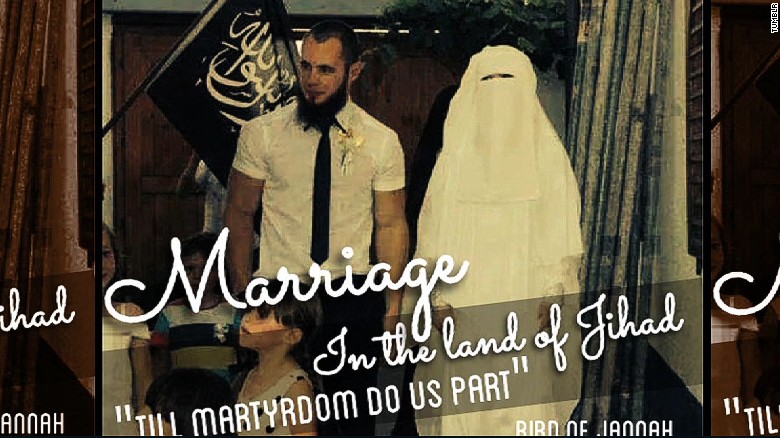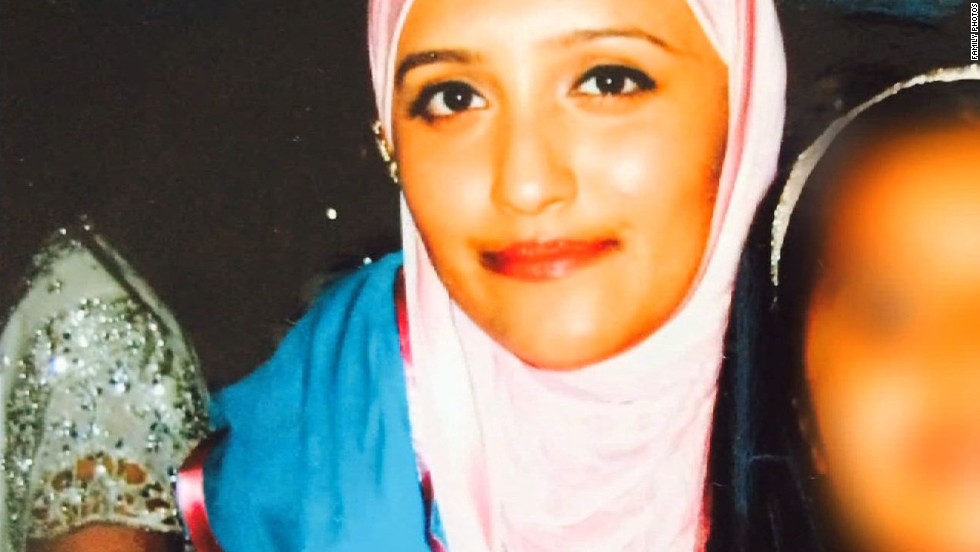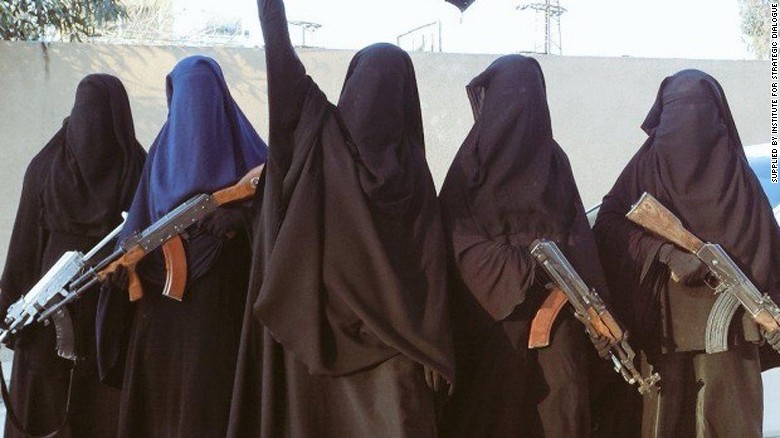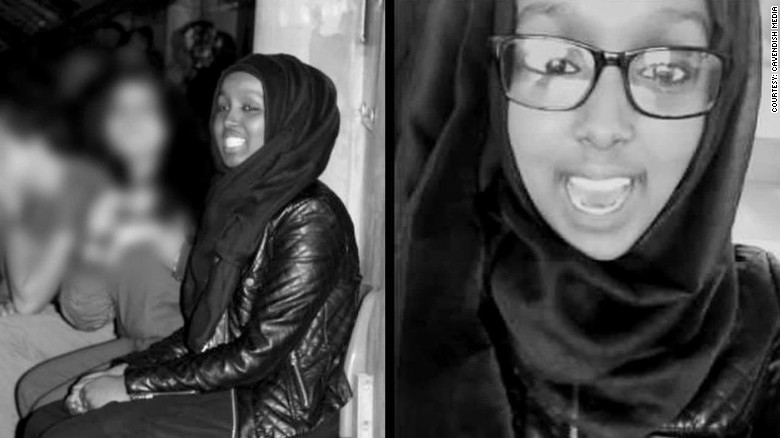 “Polako sam se približavala svom budućem mužu… Sva sam podrhtavala… Bila sam nervozna i uplašena”, tako započinje svoju priču žena koju je CNN nazvaoShams. Ona je jedna od čak petstotinjak žena, za koliko ih se smatra da su napustile svoj dom u nekoj od zapadnih zemalja i pridružile se ISIS-u. Blog počinje bajkovitim susretom, ali vjerojatno neće završiti rečenicom da su “živjeli dugo i sretno”. Znanstvenici iz Instituta za strateški dijalog (ISD) u Londonu Shamsin su blog ocijenili privlačnim ali i iznimno opasnim. Oni putem Twittera, Facebooka, Tumblra, bloga i niza platformi prate stotinjak žena kako bi istražili njihov karakter i svakodnevni život nakon odlaska u ISIS.
“Polako sam se približavala svom budućem mužu… Sva sam podrhtavala… Bila sam nervozna i uplašena”, tako započinje svoju priču žena koju je CNN nazvaoShams. Ona je jedna od čak petstotinjak žena, za koliko ih se smatra da su napustile svoj dom u nekoj od zapadnih zemalja i pridružile se ISIS-u. Blog počinje bajkovitim susretom, ali vjerojatno neće završiti rečenicom da su “živjeli dugo i sretno”. Znanstvenici iz Instituta za strateški dijalog (ISD) u Londonu Shamsin su blog ocijenili privlačnim ali i iznimno opasnim. Oni putem Twittera, Facebooka, Tumblra, bloga i niza platformi prate stotinjak žena kako bi istražili njihov karakter i svakodnevni život nakon odlaska u ISIS.
London (CNN)“I made my little steps … I was trembling. Nervous. Scared…” Shams’ breathless prose reads like a trashy romance novel, as she describes every tiny detail of her first meeting with her husband-to-be.
“After [a] few minutes, I flipped my Niqab. He looked at me, our eyes [caught] each other’s. I had palpitation[s] faster than the speed of light.
“He smiled. And he asked a question that I shall never forget for the rest of my life. ‘Can we get married today?'”
But this is no stereotypical fairy tale, and there’s no “happily ever after” ending.
It’s a dispatch from Shams, a woman who calls herself the “Bird of Jannah” and runs a blog that experts say is a compelling – and dangerous – recruitment tool for the terror group ISIS.
Shams – not her real name — is one of an estimated 550 Western women who have left their homes and families to travel to Syria and Iraq and join ISIS.
Researchers at the Institute of Strategic Dialogue (ISD) in London, curious at the “unprecedented surge in female recruits” to ISIS, are tracking more than 100 of the women through online platforms including Twitter, Facebook, Tumblr and blogs.
ISD’s database, the largest of its kind, provides a unique lens through which to see the daily lives of the women of ISIS.
They hope that by examining the way women are used by terrorist groups, analysts will better understand how the organizations work, and how to combat them.
“It really debunks the stereotypes,” said ISD senior researcher Erin Saltman. “The ages range from 13 to 40, with a range of education and professions and families. It’s very complicated.”
CNN has had exclusive access to the group’s new report. It paints a picture of a diverse group of women of different ages and backgrounds who play a variety of roles for the terror group that is now in control of large parts of Syria and Iraq. So who are the “women of ISIS?”
The blogger
Despite her high profile online, details about Shams’ true identity are scarce. Clues scattered through her posts suggest she is 27, and comes originally from Malaysia, but is of Indian and Pakistani heritage.
Trained as a doctor, she left her old life behind to begin again under the ISIS regime, where she says she runs a basic health clinic for women and children, carrying out antenatal checks, prescribing antibiotics and administering vaccines.
CNN cannot verify these claims, and repeated requests for an interview have gone unanswered.
What comes through on her blog is her reverence for ISIS. It reads as her personal love story: how she found faith, sisterhood and love in Syria.
Much of it reads like romantic fiction, full of cliff-hangers, as when her husband, purportedly an ISIS fighter originally from Morocco, doesn’t respond to texts sent while he’s on the battlefield.
“Promise me you will wait until our baby’s birth … Promise me that you will stay alive?” she asks him. “In sha Allah [God willing],” her husband responds.
She describes life in ISIS as a utopia, posting lists of “benefits” for foreign fighters — free housing, health care – and offers tips for what to pack: “bring some good cloth[e]s and boots because you will be disappointed with the quality here.”
But the realities of life in ISIS territory are stark, and as a wife in the middle of a war zone, she acknowledges the grim, “pre-destined” fate that awaits her husband on the battlefield, posting a photo with the chilling caption: “Till Martyrdom Do Us Part.”
Why ISIS is winning and how to stop it
The schoolgirls

A few short months ago, the tweets of Amira Abase read like those of any typical London teenager — which shoes to buy: Vans; her favorite football club: Chelsea; her most hated school subject: statistics.
But by January, the 15-year-old’s feed was filled with a steady trickle of posts on the plight of Syrian refugees — many directed to Khadiza Sultana and Shamima Begum, her classmates at Bethnal Green Academy in east London.
“It’s a very rapid radicalization process,” explained Melanie Smith of ISD, who mapped Abase’s online footprint to see how the girls were lured by ISIS. “We can actually see the process of her becoming more politically engaged … with Syria and finally making the decision to leave.”
It is thought that the departure of a classmate to Syria in December 2014 triggered Abase, Sultana and Begum’s interest in joining ISIS. Soon after, Abase’s tweets shed their teenage tone and became much more political and religious.
“A lot of times for women, it’s a strong emotional pull to a global problem,” ISD’s Erin Saltman said. “They see through this extremist worldview that the world is out to get this Muslim community – [that] the world is violent towards them and it’s their role and job religiously to create a safe space for all Muslims — and that’s very difficult to contradict. It’s a very empowering world view.”
In February, a picture appeared on Abase’s feed, showing three women in full-body veils with their backs to the camera. The caption read “Akhwaat,” or sisters.
Four days later, the friends were caught on camera at airport security leaving for Istanbul. Another video showed the girls meeting what police described as a people smuggler at the Turkish border to take them into Syria.
The families of the three girls made tearful public appeals for their return, but got no immediate response.
Then in April, a sign of life: a tweet on Abase’s feed of a single photo of food — kebabs and rice with the caption “Dawlah Takeaway.” Dawlah means “state” and is often used by ISIS followers to refer to the self-declared Islamic State.
All three were last believed to be in the ISIS stronghold of Raqqa.
This week lawyers for the girls’ families released a statement saying that some of the girls have made contact with their families: “They have made it known that they are safe and in good health but are no longer in the company of one another … they are unlikely to be returning to the UK in the immediate future.”
UK girls’ list for Syria trip: Makeup, bras, epilator
The recruiter

Aqsa Mahmoud‘s family believe their daughter is at least partly to blame for luring Abase, Sultana and Begum to Syria.
Mahmoud was 19 when she left her home in a wealthy area of Glasgow, Scotland, in November 2013, hugging her father Muzaffar goodbye as normal, then vanishing. Four days later, Aqsa called her parents as she crossed the border into Syria.
Since she arrived, there have regular posts on what appears to be her Tumblr blog, encouraging others to turn away from their families in favour of jihad.
And while some of those messages read like the writings of a zealot, others are pure “teenager.”
“Wow wallahiil Adheeem [I swear to God] biggest joke of this week,” one said, in response to a suggestion that UK authorities could confiscate passports of those who tried to join ISIS.
Mahmoud’s conversion to extremism stunned her parents, who insist she grew up as an ordinary teenager. “She was the best daughter you could have,” her father told CNN. “We just don’t know what happened to her.”
In a statement released when the Bethnal Green teenagers disappeared, Mahmoud’s family told her: “You are a disgrace to your family and the people of Scotland,” it said. “Your actions are a perverted and evil distortion of Islam.”
Opinion: How ISIS recruiters win in the West
The child

Zaynab Sharrouf didn’t volunteer to join ISIS; she was just 13 when her father Khaled Sharrouf, a convicted terrorist, packed up the family and – traveling on his brother’s passport, to evade the authorities — moved them from Australia to Syria.
Nonetheless, she appears to have settled in to life in ISIS territory – the ISD says blog posts suggest she “has become heavily engaged with ISIS’ violent, extreme ideology.”
Just over a year after arriving in Syria, Zaynab was reportedly married off to his father’s best friend, Mohamed Elomar, a fellow ISIS fighter originally from Sydney.
Elomar became infamous in the Australian media for posting pictures of himself, his wife and his sons holding up the heads of decapitated ISIS victims. He also claimed online to have sold captured girls as slaves for $2,500 each.
Soon after arriving in ISIS territory, Twitter posts believed to be from Zaynab began popping up, one description reading: “From the land down under to a Muhajrah in the land of Khilafah” – from Australia to a traveller in the caliphate.
The ISD says that when she first arrived in her new home, Raqqah, her messages reflected “the tastes and aspirations of a teenage girl raised in the West” – being addicted to her iPad and wanting a pink Lamborghini.
Soon, though, the Twitter posts began parroting the extremist rhetoric of her father, openly celebrating the 9/11 terror attacks. In one photo, there is a “family photo” of the women in the Sharrouf family with AK-47s in hand, seated on a white BMW.
But in another post the declaration: “I’m not an extremist. I just follow the Deen” – Arabic for “faith.”
This week, amid reports the family may be seeking to return home, Australian Prime MinisterTony Abbott warned they would “face the full severity” of the law if they did so.
What will happen to the ‘cubs of the caliphate’?
The widows

Just a year ago, twins Salma and Zahra Halane were popular, high-achieving teens, studying hard at school in northern England and aspiring to careers in medical science.
But in June 2014, the pair – then aged 16 — ran away from what the local community describes as a “very religious family home in northern England, in June 2014, traveling first to Turkey and then across the border into Syria.
Within weeks, according to the ISD, they had both been married to ISIS fighters; on what’s believed to be Salma’s account, there is advice to other would-be recruits on how to find a husband in ISIS territory.
The ISD says her sister Zahra uses her strong Twitter presence to celebrate and encourage the work of Islamic terrorists.
On September 11, she is said to have tweeted: “Happy #9/11 Happiest day of my life. Hopefully more to come InSha Allah #IS” and she also appeared to revel in news of the Charlie Hebdo attacks in Paris in January.
The ISD believes both girls’ husbands were killed within days of each other last December. Zahra purportedly announced her husband’s “martyrdom” in a tweet on December 6: “He was a blessing from Allah … I will join him very sooooon :’)”.
Less than a week later, a post believed to be from Salma: “May Allah accept my husband … I am among the [wives] of shuhada [martyrs] and [I’m] honoured to be chosen”.
CNN cannot confirm the authenticity of either of the posts attributed to the girls by ISD.
The girls, who are of Somali descent, are thought to have been influenced by their older brother, who, according to authorities, traveled to the battlefields of Syria in 2013. He has reportedly left the war behind and is now in Denmark, according to the ISD and a community leader in Denmark.
The family has not responded to CNN’s request for comment on this story.
The twins appear defiant on social media, but analysts say such combative public profiles often mask private doubts. But even if the girls do want to leave ISIS, they face a tougher journey than their brother.
“If you are a female and you journey to ISIS territory, it’s 10 times harder for you to return back to Western society,” explains Saltman. “We have a few hundred cases of men who have returned, but for women it’s almost impossible.
“This is because just to leave your house you need to have male permission. You need to have an escort to take you around. Once you arrive in ISIS territory your passport is … confiscated. For you to try and leave and wander towards to border is almost impossible.”